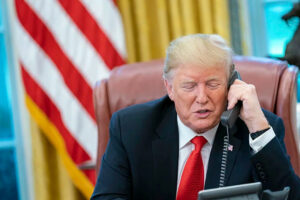Hanging over the world, a second Trump term

THE same question that hangs over American democracy also casts a shadow over all of world politics: What if Donald Trump walks back into the White House in 2025?
He may or may not. But if he does, he’ll feel unshackled from even the few fetters that restrained him in his first term, and will try to bring all branches of federal government under his personal control in order to go after his domestic enemies.
Just as ominously, Trump would also revert to his foreign policy of chaos, driven by instincts and complexes rather than interests and principles. John Bolton, Trump’s former national security advisor, describes the result as “an archipelago of dots, unconnected by chords of logic.”
There are those around the world who’d be giddy — the populists, strongmen, and autocrats, the type Trump befriends, admires, and emulates. One is Victor Orban, prime minister of Hungary and darling of America’s MAGA right. Another is Benjamin Netanyahu, the Israeli prime minister who channels Trump in weaponizing the institutions of democracy to gain personal power — and stay out of jail.
The most sinister foreign fan, though, is Vladimir Putin, the Russian president who rooted for Trump in 2016, authorized Russian influence operations for him in 2020, and would love to strike a deal with The Donald in 2025 — about carving up Ukraine and much else. The administration of US President Joe Biden now assumes that Putin will therefore keep up his bloody but stalled assault against Ukraine at least until the American election.
For that same reason, Ukraine is terrified about a second Trump term. Recall that Trump’s first impeachment centered on his withholding of aid to Kyiv to pressure it into going after the Biden family. In Trump’s mind, Putin’s brutal war of aggression is little more than a territorial dispute in which the US and its allies have little at stake. Whereas Biden has held together the West in support of Kyiv, Trump would probably abandon the Ukrainians to their fate, or force them into negotiations against their will.
That prospect also spooks America’s partners. In his first term, Trump made clear how little he thinks of alliances, even NATO, the mutual-defense bloc that has deterred the Kremlin since 1949. He cast doubt on America’s resolve to honor NATO’s Article 5 — which says that an attack against one is an attack against all — and threatened to pull out of the alliance altogether. In his second term, he just might.
Whether he would or not, the mere possibility unsettles NATO members such as Estonia, Latvia, and Lithuania — post-Soviet nations that would feel most threatened by Russia if it succeeds in Ukraine — and non-NATO allies such as South Korea and Japan. Meeting with Biden at Camp David last week, they took a first step toward a NATO-lite alliance in East Asia to deter China. With Trump in the White House, they may conclude that America’s word is not to be trusted. That same thought may tempt China to attack Taiwan or seize more of the South China Sea.
At a more general level, Trump would bury whatever remains of the notion that America, a fading superpower that’s nonetheless the closest thing the world has to a hegemon, should lead internationally to maintain order. In place of principles, Trump would make policy with a brute and opportunistic transactionalism — a commercial deal here and a trade war there, a photo-op with a dictator here and the snub of an ally there. That archipelago of dots again.
What can America’s allies do to prepare? The logical conclusion for blocs such as the European Union (EU) would be to finally pool military strength in the form of a “European Army” that can deter aggression even without American might. French President Emmanuel Macron, who likes to talk up Europe’s “autonomy,” ought to favor that path, even putting his country’s nuclear arsenal at the service of the whole EU.
In practice, he won’t. Nor will the EU, a fractious bunch, compensate for American withdrawal by becoming a United States of Europe. The more likely result of Trumpist isolationism is that Europe’s regional powers would again drift apart. The Poles, if they still have their populist government, might flirt with Trump for special deals. The Germans might revert to historical type and negotiate with the Kremlin over the heads of their eastern neighbors. The French would try to stay aloof in Gaullist hauteur.
Such fragmentation and disorder would manifest in other regions. International politics is inherently anarchical and requires either a hegemon or a balance of power to maintain order. Without the first — which took the form of a Pax Americana since World War II — the world would probably revert to searching for the second. This path tends to lead through a series of wars, especially as China will vie with the US for supremacy in the nascent global system.
America’s allies are well aware of these scenarios. So I asked Michael Link, the coordinator for transatlantic relations at Germany’s foreign ministry, how they’re preparing. Germany and its European partners should use the time until the election to seal as many pacts as possible with the Biden administration, he told me via e-mail. Simultaneously, the Europeans should build “good, robust relationships” with Republicans in Congress and elsewhere. If Trump then tries to leave NATO or close US bases in Germany, America’s allies could “mobilize these contacts … to work around Trump.”
Forgive me, but that’s it? Indeed it is. Neither Europe nor East Asia or any other region of the world knows how to step up to the challenge of Trump 2.0 and the associated forfeiture of American leadership. The best they can do is talk to other Republicans and hope that the better angels within the GOP save the world from disaster.
Here’s hoping that those better angels still exist in the erstwhile Party of Lincoln. Tonight’s debate among Trump’s challengers for the Republican nomination, which he is ghosting, may offer some clues. One glimmer of optimism came out of the Senate last month, when it passed a bipartisan bill that would prevent any president from pulling out of NATO without two-thirds approval in the Senate or an Act of Congress. Getting it past Republicans in the House will be harder though.
US elections are almost never decided on foreign policy. But US voters, and especially Republicans, must be aware that what’s at stake in 2024 is the future of not only the country but also the world. Nuclear non-proliferation, the fight against climate change and other forms of international cooperation, as well as the struggles between autocracy and democracy and disorder and order — all this will in effect be on the ballot.
Will Trump walk back into the White House? America’s foes hope so. Its friends pray he won’t.
BLOOMBERG OPINION




